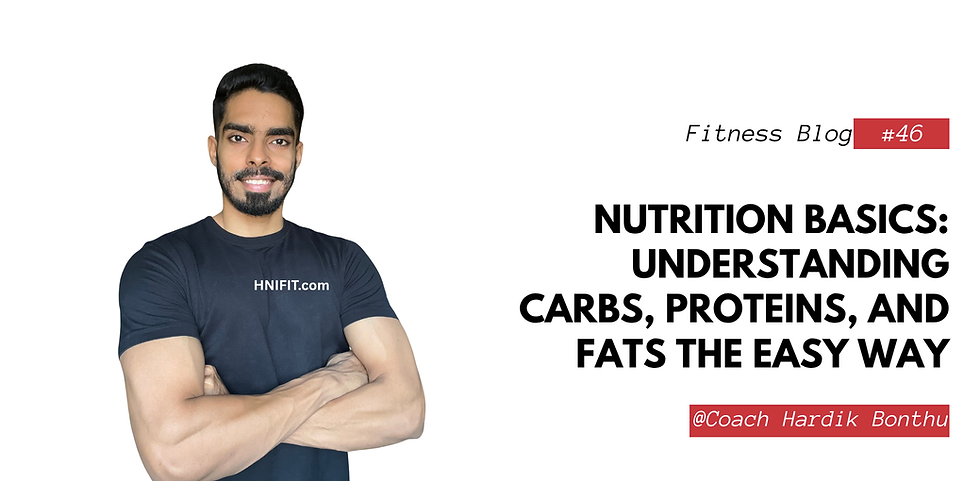Nutrition Basics: Understanding Carbs, Proteins, and Fats the Easy Way
- Ayush HNIFIT
- Jul 25, 2025
- 4 min read
Updated: Jul 30, 2025
A Simple Guide to Fueling Your Body Right
Introduction: Why Understanding Nutrition Matters
You’ve probably heard the phrase, “You are what you eat.” But for most people, nutrition can feel overwhelming. There are keto diets, high-protein plans, low-fat rules, and endless talk of carbs. So, what’s actually essential to know?
At its core, good nutrition boils down to understanding macronutrients—carbohydrates, proteins, and fats. These three nutrients provide the energy and building blocks your body needs to function, recover, and thrive.
This article breaks down these macros in plain, easy-to-understand language, helping you make smart choices without stress or confusion.

1. Carbohydrates: Your Body’s Main Energy Source
What Are Carbohydrates?
Carbohydrates (or “carbs”) are sugars, starches, and fibers found in foods like fruits, vegetables, grains, and dairy. When you eat carbs, your body breaks them down into glucose (sugar), which fuels everything from walking to thinking to working out.
Types of Carbs
Simple Carbs – Found in sugary foods like candy, soda, white bread. These spike your blood sugar quickly but don’t keep you full for long.
Complex Carbs – Found in whole grains, legumes, fruits, and vegetables. These digest slower, giving you long-lasting energy and more nutrients.
Healthy Carb Sources
Oats
Brown rice
Quinoa
Sweet potatoes
Whole wheat bread/pasta
Fruits like apples and berries
Vegetables like carrots, broccoli, and spinach
How Much Do You Need?
Carbs should make up about 45–60% of your daily calories, depending on your activity level. If you work out regularly, you may need more for fuel.
Quick Tip: Choose carbs that are high in fiber and low in added sugars.
2. Proteins: The Building Blocks of Your Body
What Is Protein?
Protein is made up of amino acids, which help build and repair muscles, support hormones, strengthen your immune system, and more. Unlike carbs, protein isn’t primarily an energy source—it’s a builder and healer.
Why Is Protein Important?
Helps build lean muscle
Aids in recovery after workouts
Supports your metabolism
Keeps you feeling full longer
Protein-Rich Foods
Chicken, turkey, and lean beef
Eggs
Fish and seafood
Greek yogurt
Cottage cheese
Lentils, beans, and chickpeas
Tofu and tempeh
Protein powders (whey, pea, etc.)
How Much Do You Need?
General rule:
Sedentary adults: 0.8g per kg of body weight
Active adults: 1.2–2.0g per kg
For example, a 70 kg (154 lb) active person may need around 105g of protein per day.
Quick Tip: Try to include a source of protein in every meal for steady energy and muscle support.
3. Fats: The Misunderstood Nutrient
What Are Fats?
Fats often get a bad reputation, but they’re essential for brain function, hormone production, joint health, and absorbing vitamins like A, D, E, and K.
Types of Fats
Unsaturated Fats (Good):
Found in nuts, seeds, avocados, olive oil, and fatty fish
Help lower bad cholesterol and reduce inflammation
Saturated Fats (Limit):
Found in butter, cheese, red meat, and some oils
Too much may raise LDL (bad cholesterol)
Trans Fats (Avoid):
Found in some processed foods, baked goods, and margarine
Increases risk of heart disease
Healthy Fat Sources
Avocados
Olive oil
Almonds, walnuts, chia seeds
Fatty fish like salmon and mackerel
Natural nut butters
Coconut (in moderation)
How Much Do You Need?
Fats should make up 20–35% of your daily calories. Just a small amount of healthy fat goes a long way.
Quick Tip: Don’t fear fat—just choose the right kinds and keep portions moderate.
Putting It All Together: The Balanced Plate
An easy way to balance your macros is to follow the "Plate Method" for meals:
Food Group | Plate Portion |
Vegetables | Half your plate |
Lean Proteins | Quarter of your plate |
Whole Grains/Carbs | Quarter of your plate |
Healthy Fats | 1–2 tablespoons |
This gives your body a balanced blend of energy, strength, and nourishment.
Macronutrient Myths Busted
Myth: Carbs make you fat
Truth: Overeating anything can lead to weight gain. Complex carbs are vital fuel for your body.
Myth: You need high protein only if you’re a bodybuilder
Truth: Everyone needs protein for daily cell repair and immune support, especially as you age.
Myth: All fats are unhealthy
Truth: Healthy fats protect your heart, support brain health, and help absorb vitamins.
Listen to Your Body: Not Every Diet Fits All
Everyone's body is different. Some people thrive on higher carbs (like runners), while others feel best with moderate carbs and more protein. The key is to:
Experiment
Track how you feel
Adjust as needed
Avoid extreme diets unless advised by a healthcare professional. Focus on sustainability, balance, and enjoyment.
Bonus Tips for Easy Nutrition Wins
Drink enough water (2–3 liters/day)
Plan meals to avoid last-minute unhealthy choices
Prep protein ahead (like grilled chicken or boiled eggs)
Snack smart with nuts, fruit, or yogurt
Don’t skip meals—this can cause cravings later
Read labels to avoid hidden sugars and unhealthy fats
Final Thoughts: Simplicity Wins
Nutrition doesn’t have to be complicated. If you can understand the role of carbs, proteins, and fats, you’re already ahead of the game. Focus on eating real, whole foods and balancing your plate. Fuel your body like you care about it—because you should!
“Eat food. Not too much. Mostly plants.” – Michael Pollan
When in doubt, go back to basics. Choose foods that grow, move, or are made with minimal processing. That’s the real secret to lifelong energy, health, and fitness success.
.png)



Comments